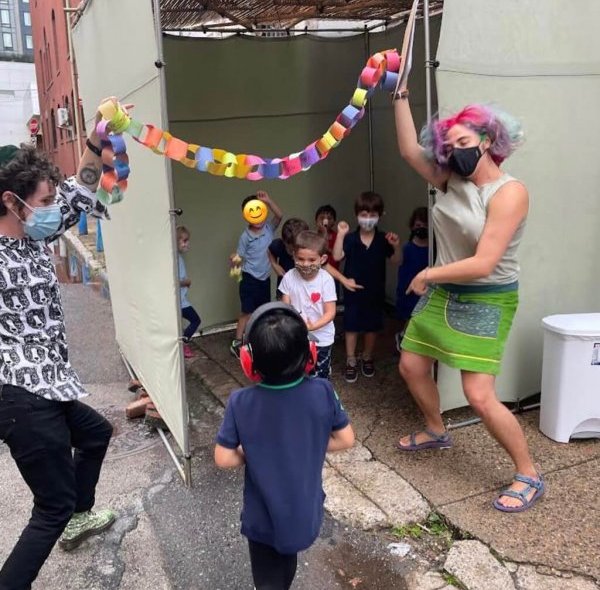
Sukkot is here! Our sukkah is up! Makom Community is ready celebrate with our neighbors and strangers!
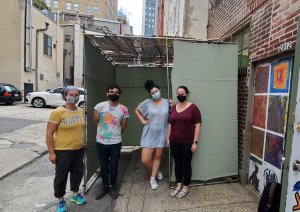
Last week, we explored the commandment to love our neighbors and this week, we unpacked it’s equally important counterpart: to love the stranger and treat them as one of our own people (Leviticus 19:33-34).
The Garinim pondered questions like:
Who is a stranger? How can we tell?
- Somebody you don’t know
- Someone you don’t recognize – even if you’ve seen them before, you don’t remember
- Someone who was in your family and moved away and came back a long time later
Have you ever felt like a stranger?
- When I was a baby and I didn’t know anyone
- When I first came to Makom Community
How are we supposed to treat strangers? Why?
- Nicely
- Love them like they’re friends and family
- Like grandparents – care a lot about them even if they’re far away
There was some debate about this last question. One kiddo wondered if the stranger was maybe bad, like they would try to steal something from you if you weren’t paying attention, so we should treat them badly. I pointed out that if this hypothetical person were a stranger to us, then we would also be a stranger to them. I asked this kiddo if she, as a stranger, would go and sneakily steal someone else’s stuff. Of course not! So we speculated that maybe she can feel so certain about that because she isn’t a stranger to herself – she knows herself already! She knows she doesn’t steal things. It’s harder to trust and feel compassion for people we don’t know yet. But does it ever help to treat them poorly just because we’re feeling scared and uncertain?
The Torah tells us only one time to love our neighbors, but a whopping 37 times to love the stranger. Why do you think that is?
- Loving your neighbor is easier.
- People kept forgetting about loving strangers, so we needed more reminders.
- Because everyone is different and everyone deserves love.
Right now, we’re in the middle of celebrating Sukkot, a holiday where Jewish people build and dwell in temporary outdoor structures – solid enough to provide shade and keep out a light drizzle, but not so much to withstand a significant storm. Into these little huts of vulnerability, we have a strong tradition of welcoming guests. On Monday, the Garinim prepared for welcoming folks into the Makom Community sukkah by creating decorations (illustrations and paper chains) with welcoming messages on them. Here’s some of what we came up with:
- I like you.
- I love you.
- Welcome back!
- You are kind.
- Hello! I made this sukkah for you!
- I’m glad you’re here.
- I want you here.
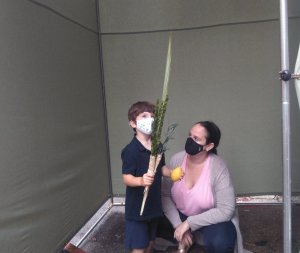
On Monday, the Shorashim discussed the difference between welcoming neighbors and welcoming strangers. Given that many of the kids are taught not to talk to strangers, we discussed how to reconcile this with the Torah’s command to love strangers, considering other ways to practice acting with love toward folks who are new to our communities.
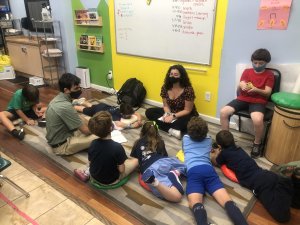
We discussed what it feels like to be a stranger, or feel left out of a group and not be able to express it to anyone. We then did an activity where kids had to work together to get into groups silently based on a shape taped on their forehead.
On Thursday, we watched a short, silly “Shaboom” video that introduced the concept of Hachnasat Orchim, which means welcoming guests. Kids shared things their families do to welcome guests. From this, we learned ways that all families are different; for example some clean up their house before having people over, and others don’t. Other things include unplugging the TV, making food, playing board games, ensuring that guests feel comfortable, and asking if our guests would like a hug. During the pandemic, Hachnasat Orchim can also include things like asking if guests want us to keep our masks on.
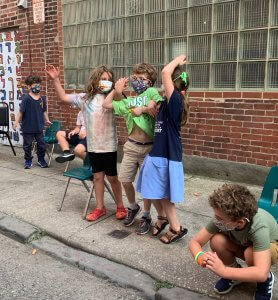
Throughout the week, we also made lots of Sukkot crafts. Using paper, popsicle sticks, pompoms, markers, and more, a variety of fruits and flowers were made to decorate the Makom Sukkah.
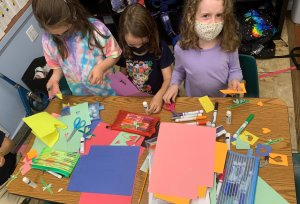
On Monday, Nitzanim started off the day playing a game of “Gam Ani,” which means “me too” in Hebrew. We went around sharing things about ourselves to see what we do and don’t have in common with one another. Here’s some things Nitzanim has in common: Loving Mac ‘n Cheese, loving to dance, and celebrating both Christmas and Hanukkah. We then connected this to our discussion around what makes us strangers or neighbors.
Some insights:
- Strangers are people who we are afraid of/might be afraid of us
- “You can’t get close to them if you’re afraid of them”
- Treat others, including strangers, how you want to be treated
- “Everyone is a stranger to someone”
- Strangers can become neighbors through kind words
After doing some tefillah outside, we brainstormed how we could bridge the gap between neighbors and strangers. Some wrote letters, others drew comics, and others built what it looks like to bridge this gap.
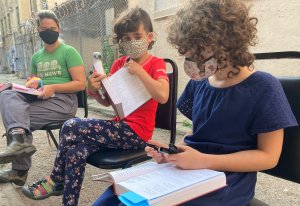
On Tuesday, we did an indoor Tefillah activity where each kiddo picked meaningful parts of the Birkot Hashachar prayer. Then we glued them to construction paper and decorated around the prayer some representations of the prayer! We also got a chance to spend time in the Sukkah to shake the lulav and etrog as part of the Sukkot tradition.
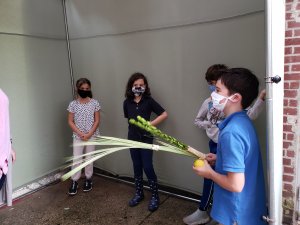
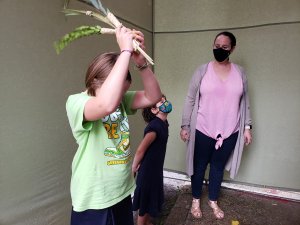
We are so excited to see what next week brings as we celebrate Simchat Torah!
